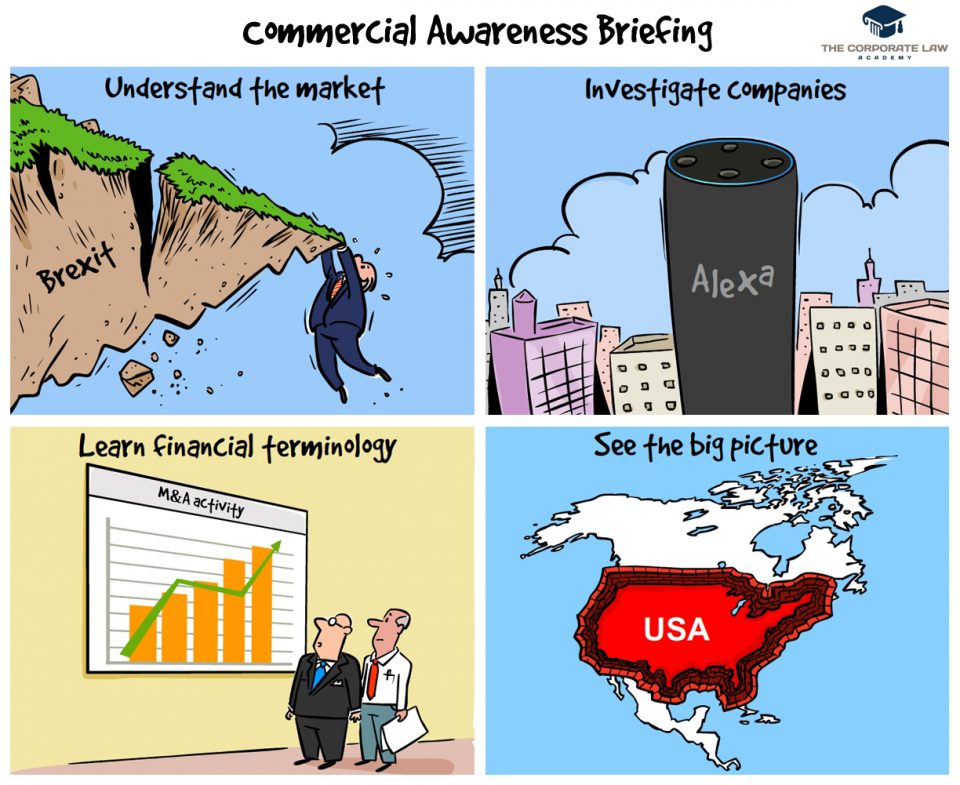Commercial Awareness Update May 2018
Welcome to Part 1 of our commercial awareness update for May 2018

BT’s radical cost-cutting plan
- The story: In one of its biggest transformations in a decade, BT is cutting 13,000 jobs in a bid to reduce costs and improve investor confidence in the company. In early 2017, BT was fined the largest penalty ever imposed by Ofcom for breaching contracts with telecoms providers, and recently, Ofcom warned BT that unless it invests more into full-fibre networks, it’ll be at risk of ‘fading away’. Later in 2017, BT was also fined £225m for an accounting scandal within its Italian operations.
- Impact on law firms and clients: BT dominates the UK broadband market through its subsidiary, Openreach, but for years the communications regulator, Ofcom, has been putting pressure on BT to adapt. Ofcom’s warning that BT should invest in new technology comes as a recent report revealed that the UK lags far behind Europe on broadband speed. The story sheds light on the competition and regulatory issues that businesses face when they are effectively monopolies and own large shares of their markets.BT will also need to be wary of employment legislation and undertake consultations with unions to minimise any legal or reputational risks during the redundancies. BT is already dealing with the second-worst funded pension scheme in the world, which poses a significant liability for the business.
The US-China trade war
- The story: There’s never a dull day when it comes to Trump’s negotiations with China. His demands call for, among other things, China to reduce their tariffs, narrow their trade surplus with the US, remove their state subsidies for certain industries, and lift their restrictions on foreign companies doing business in China. The two countries are currently in trade talks after Trump lifted US sanctions on Chinese telecoms company ZTE, allowing it to resume operations (despite the company pleading guilty to illegally shipping US goods to Iran).
- Impact on law firms and clients: If China concedes on these trade demands, it should be a good thing for foreign businesses and law firms. China has already announced that it’ll open its market for financial services and the automobile sector, and under the new terms, there’s scope for China to allow foreign firms to do business in the country without having to set up a joint venture with a Chinese partner. So far, these restrictions have limited the ability of law firms to do business in the region, so if they’re lifted, it opens up a variety of legal work both in and out of the country.
Takeda Pharmaceutical Co. to acquire rival Shire
- The story: If it goes through, the $46bn deal to acquire Shire will be the largest ever acquisition by a Japanese company and place Takeda among the top global pharmaceutical companies by revenue. It’ll also give the Japanese company entry into the lucrative US market, where much of Shire’s business takes place.
- Impact on law firms and clients: The healthcare sector is a huge market for M&A lawyers and it’s set to boom in 2018 thanks to US tax reform, the costs of bringing a new drug to market, existing drugs going off patent and competition from generic drug firms. In the healthcare sector, M&A offers a fast growth strategy and a way to access an immediate pipeline of drugs.
HSBC’s road to recovery
- The story: From Mexican money laundering to failed acquisitions, HSBC has had its fair share of scandals over the last few years. Just recently, the firm put aside $897m to cover costs relating to the mis-selling of mortgage products before the financial crisis and, as a result, HSBC announced a fall in pre-tax profits for the first quarter of 2018.
- Impact on law firms and clients: Banks have had to spend billions to settle regulatory fines for their activities before, during and after the financial crisis, and then some more to overhaul their systems. This is likely to have squeezed the legal budgets for some banks forcing law firms to consider alternative fee arrangements, such as fixed fees, so they can keep their roles as legal advisers. On the flipside, these fines have led to a high volume of work for financial regulation and regulatory and investigation teams within law firms.
Carillion report criticises accounting firms and legal advisers
- The story: In a recent MP report, three magic circle law firms, several US firms and the big four accountancy firms were criticised for “squeezing fee income” out of Carillion, the recently collapsed government contractor. The big four were also criticised for turning a blind eye to what was going on at Carillion and pocketing large sums in the process.
- Impact on law firms and clients: The collapse of Carillion is one of the biggest British company failures in recent years and it has since created a host of work for restructuring, insolvency, employment and litigation lawyers. The report also made several critical suggestions. It asked the Insolvency Service to check whether the former directors at Carillion could be disqualified for breaching their duties under the Companies Act. It also called for the big four accountancy firms – KPMG, PWC, EY and Deloitte – to be referred to the UK regulator, the Competition and Markets Authority, to determine whether they should be broken up. This would be a radical shake-up in the industry and the accountancy firms have already begun to draft contingency plans.
[blog_teaser title=”” title_tag=”h3″ category=”” category_multi=”” margin=”1″]
